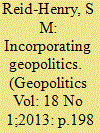| Srl | Item |
| 1 |
ID:
121441


|
|
|
|
|
| Publication |
2013.
|
| Summary/Abstract |
This paper develops a critique of the emergence of the new European Border Agency, Frontex, specifically its operations along Europe's maritime borders with North Africa. Rather than account for Frontex in terms of securitising and neoliberalising processes, as has become common, I focus instead on the underlying geopolitical rationalities that guide Frontex operations. These reflections then set up the further argument of the paper: that what Frontex itself sheds light upon is a novel geopolitics of the border, what can be thought of as an 'incorporating geopolitics'. Through investigation of the policies and practices of Frontex, such an incorporating geopolitics can be shown to be replacing the much-discussed paradox of contemporary border regimes - that between trade freedoms and security restrictions - with a more fundamental contradiction: that the more border controls address more than just borders, the more they may themselves undermine the societies they purport to protect.
|
|
|
|
|
|
|
|
|
|
|
|
|
|
|
|
| 2 |
ID:
053386


|
|
|
|
|
| Publication |
Autumn 2004.
|
| Summary/Abstract |
The transborder and trilingual Maas–Rhine Euroregion is often presented as a laboratory for European integration. The authorities in the region promote the image of a region that has ‘always’ been a unity, but which is divided by artificial boundaries – ‘scars of history’ – as a result of power politics. In this essay this image is confronted with the reality of the cross-border interactions and identities of the people involved. This confrontation leads to the conclusion that although there is political, economic and cultural cooperation in the region, the region is not at all politically, economically and culturally integrated. The national border as a physical barrier may have been removed, but the economic, social, juridical and cultural barriers are still there. The unification and integration of the citizens living in the region is being impeded by conflicting national systems of law and regulations, by communication and information media focused on national issues, by nationally oriented infrastructure, and especially by strongly different national cultures and identities. The consequences for European integration in general are analysed by comparing this regional integration with the national integration and nation-building policies of the past.
|
|
|
|
|
|
|
|
|
|
|
|
|
|
|
|